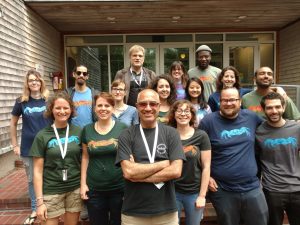Teaching
Biology 161 Principles of Human Physiology
Examines physiological systems of the human body. Lecture provides basic information regarding function of these systems from an integrative perspective. In laboratory, use hands-on approach and work in small groups to conduct experiments and/or carry out projects to illustrate the physiological concepts presented in lecture.
Biology 305W Human Physiology
The study of general physiological principles necessary for basic understanding of life processes. This lecture/lab course provides an in depth examination of the function of multiple systems in the body including nervous, endocrine, cardiovascular, respiratory, urinary, skeletal muscle, reproductive and digestive systems. The laboratory component enables students to gain a hands-on understanding of the function of several systems.
Biology 400W Contemporary Issues in Biology: Neuromodulation, Cells to Circuits
The nervous system must constantly adapt to changes in the internal state of organisms and their external environment. This course examines the process of neuromodulation and how it alters synapses, intrinsic properties of individual neurons, and circuits of neurons to enable organisms to produce variations in their behaviors.
Biology 491 Seminar in Biology: Neural Control of Movement
The examination of how the central nervous system controls movements, with a focus on rhythmic behaviors such as locomotion, respiration and chewing. Primary literature involving studies in a variety of organisms are used to examine how rhythmic movements are initiated, maintained and terminated.
Biology 710 Seminar in Biology: Neural Plasticity
Neuromodulatory mechanisms underlying neural plasticity are important in enabling the nervous system to respond to changes in behavioral state or physiological conditions. Further, disruption of these mechanisms contribute to nervous system disorders. Thus to understand both function and dysfunction of the nervous system, it is important to gain an understanding of neuromodulation. This seminar course explores recent studies on neuromodulatory mechanisms with particular attention to the role they play in regulating synapses and circuits and subsequent consequences for neural function and behavior.
Biology 710 Seminar in Biology: Endocannabinoid Signalling in the Nervous System
We explore how endogenous cannabinoid molecules regulate synaptic strength throughout the nervous system, including their roles in regulating neuron-neuron as well as neuron-astrocyte-neuron communication. Primary literature highlights the wide range of physiological roles for endogenous cannabinoids and the potential for treatment of dysfunction ranging from obesity to seizures, PTSD, and mood disorders.
Other Institutions
Neural Systems and Behavior (Marine Biology Laboratory, Woods Hole, MA)
The Neural Systems and Behavior (NS&B) Course is the premier discovery-driven training opportunity for the next generation of neuroethologists and systems neuroscientists. It is an 8 week intensive lecture and laboratory course held at the Marine Biological Lab (MBL) in Woods Hole, MA, every summer. Course facebook page
Learn about the neural basis of behavior and state of the art research approaches in a variety of organisms by watching lectures from the NS&B course! Or watch many other MBL course lectures and special presentations.
The STG group (NS&B 2015) discussing data outside the lab. (Image courtesy of Wolfgang Stein)
“Woods Hole is to scientists as Paris is to artists.”
Copyright © Blitz Lab, 2021


